This post is called triple whammy because it is a dump of three terms. As one can guess from my absence on this blog, it’s been one helluva busy period in my life leaving barely for fun stuff like blogging . Anyway, here’s term by term recollection of what just went in my life.
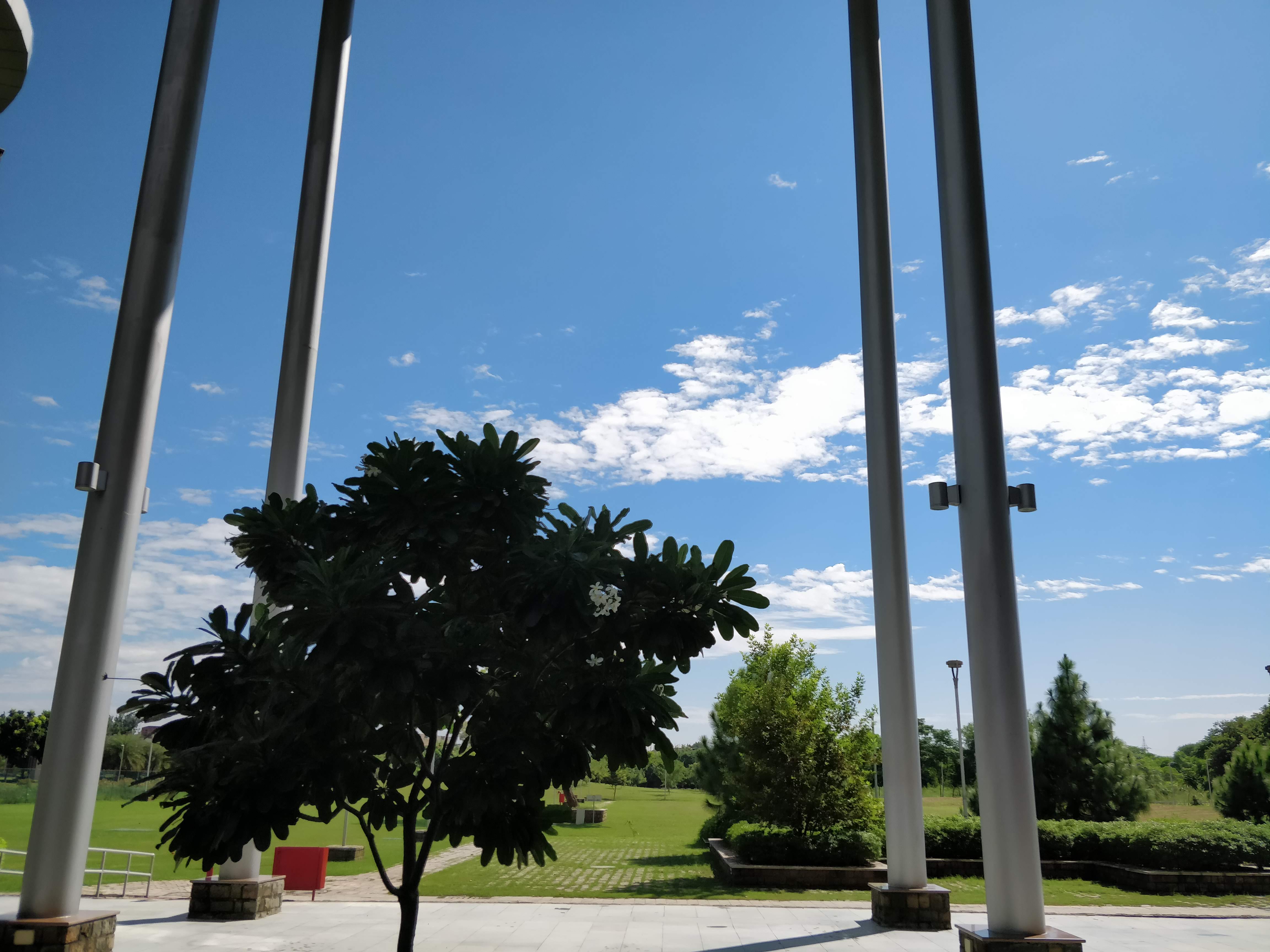 Term 4: Calm before storm
This term was overload continued. But most of us were used to by now.
The term kicked off with a loss in regional round of “The Hindi Boardroom Challenge”. To show some action in the education section of their resume, ISB students participate in competitions of all sorts
. A team I was a part of also qualified for one such competition - “The Hindi Business Line on Campus - Boardroom Challenge” (What a mouthful, referred to as HBL ahead)
. Most college competitions consist of one campus round where a team is picked from every college followed by a regional/national round to select the final winners
. The campus round of HBL was a quiz with 8-10 questions which were scenarios that a CEO (or a company board) might encounter. Eg: XYZ has happened reducing the demand for the things made in your plant, what would you do? A
. Layoffs B. Repurpose .. Through what is a mystery to all of us, we qualified for the second round. The second round a typical marketing case, we were a soap company (MBAs, soaps, do you see it?) and were given a bunch of information about consumer trends across regions, soap demand, costs and price points
. Our goal was to identify next steps for the company which meant identify the best soap to launch. However, solving such an obvious problem seemed lame for ISB students, we instead decided to pitch an e-commerce business providing soaps as a subscription service hoping we would stun the judges with our innovative idea
. The judges were stunned indeed but not in a good way, they just wanted us to solve the case and pick the right region, soap type, price point, etc. I sensed strong personal biases against e-commerce amongst one of judges by way of their comments and realised my team was done
. Looks like we were too ahead of our times here.
Term 4: Calm before storm
This term was overload continued. But most of us were used to by now.
The term kicked off with a loss in regional round of “The Hindi Boardroom Challenge”. To show some action in the education section of their resume, ISB students participate in competitions of all sorts
. A team I was a part of also qualified for one such competition - “The Hindi Business Line on Campus - Boardroom Challenge” (What a mouthful, referred to as HBL ahead)
. Most college competitions consist of one campus round where a team is picked from every college followed by a regional/national round to select the final winners
. The campus round of HBL was a quiz with 8-10 questions which were scenarios that a CEO (or a company board) might encounter. Eg: XYZ has happened reducing the demand for the things made in your plant, what would you do? A
. Layoffs B. Repurpose .. Through what is a mystery to all of us, we qualified for the second round. The second round a typical marketing case, we were a soap company (MBAs, soaps, do you see it?) and were given a bunch of information about consumer trends across regions, soap demand, costs and price points
. Our goal was to identify next steps for the company which meant identify the best soap to launch. However, solving such an obvious problem seemed lame for ISB students, we instead decided to pitch an e-commerce business providing soaps as a subscription service hoping we would stun the judges with our innovative idea
. The judges were stunned indeed but not in a good way, they just wanted us to solve the case and pick the right region, soap type, price point, etc. I sensed strong personal biases against e-commerce amongst one of judges by way of their comments and realised my team was done
. Looks like we were too ahead of our times here.
Term 4 was the first crossover term. Till now, we had courses and people studied with their sections. This term we had two core courses and two electives . This meant people started mingling outside their sections/groups and made new friends!
Out of FOMO to do something extra. I decided to pursue an informal ELP. ELP (short for Experiential Learning Programme) are projects that ISB sources from the industry where MBA students can apply their business gyaan and be useful to a business . Having not participated when the college officially rolled out ELPs, I managed to get an ELP informally with Homefuly, a startup by ISB alumni trying to help people pick the best furniture for their homes.
Amidst all this madness, I tried to port my number out of Vodafone but the process somehow failed. Then Vodafone threw me a bone in terms of a reduced monthly plan and free Amazon Prime and Vodafone Play, so I decided to stick it out with Vodafone. I DID STANDUP COMEDY ISB has a standup SIG (SIG = Special Interest Group, small club-like bodies that students can setup to try things out). Though I wanted to be a part of it since the start, acads and club work hadn’t allowed me to get involved and these folks had done some amazing skits earlier . When they finally came around to organising a open mic night, I decided to just go for it. I had been dreaming so much about performing standup that I had already put it in my resume in anticipation of doing it in the future! I had been making notes of funny things I had observed around me since the time college had begun . This provided a decent source of material for the event. I had about 2-2.5 weeks to prepare the material, I scrubbed it down to the best and went forward with it . I practised in front of the mirror multiple times and later also did a little test performance amongst friends. This really helped me tune my material . Needless to say I was still nervous on D-day. The students had organised a talent night and people were having a go at various things: singing, music, etc . I was amongst the last few acts and one of the only two folks doing stand-up. I had jitters as I moved on stage but I was carrying my jokes on a paper with me and referring it amply (I’m a new-bie after all) . It was a dimly lit auditorium with about 60-70 people in attendance. Falling on my face was an intensely bright spotlight which made it hard to see the audience and made the experience of being on stage a bit disconcerting . But I decided to be bold and go for it. I got a few quick cheap laughs by cracking puns. Some of my jokes bombed, especially the ones targeted against women and I dropped many other lame ones on the spot . One of my jokes about an annoying academic associate really got the crowd going and it was a real fiery set after that. I retired to decent applause and lots of “wow that was amazing” “killed it” from batchmates. It was a real thrill, I enjoyed and fortunately others did too! My resume turned out to be prescient . I did it twice in 2 weeks, once again performing as the opening act for a local comedian during Equinox (ISB Mohalis annual alumni gathering)
My Habits improved. Throughout this term I was magically able to wake up earlier and earlier. Through a workshop for Product managers conducted by one of our alumni Nishant Pandey (who is EVP – Product at InfoEdge) I became aware of the Anna Karenina principle. I now am a firm believer in the Anna Karenina principle . And I want to tell it everybody, even it’s 2 AM at a party and we’re both kinda drunk and sleepy.
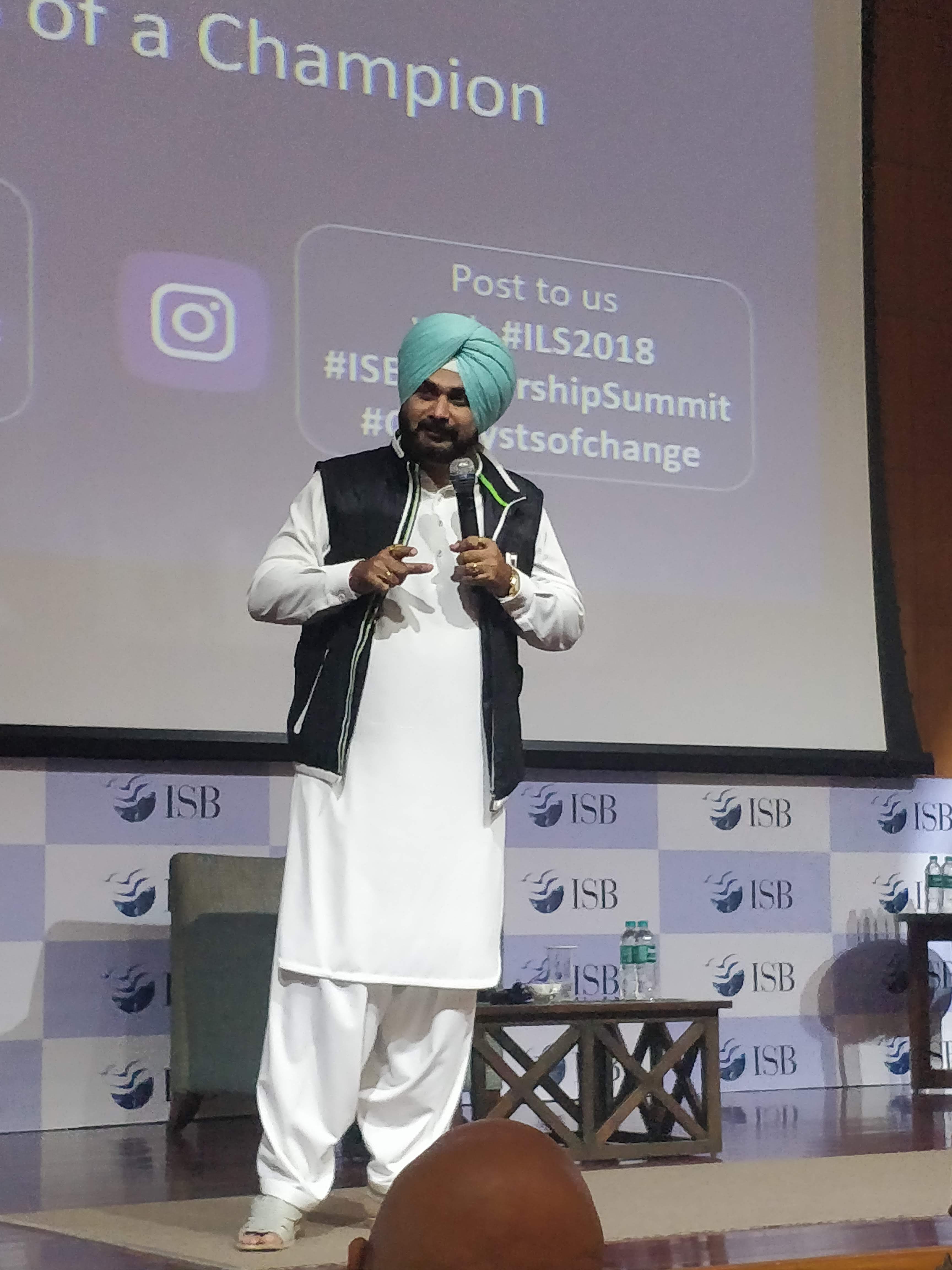 Three of ISB’s flagship events happened back to back. First ILS (ISB Leadership – a general gathering of CEOs, business leaders and other big shots) followed by Equinox (the annual alumni reunion for the Mohali Campus) followed by Artha (a finance conclave)
. The theory is that ISB knows the students just sit around and do nothing after placements so they jam as many events as they can before placements, so that students motivated by fancy work on their resume put in some effort.
Three of ISB’s flagship events happened back to back. First ILS (ISB Leadership – a general gathering of CEOs, business leaders and other big shots) followed by Equinox (the annual alumni reunion for the Mohali Campus) followed by Artha (a finance conclave)
. The theory is that ISB knows the students just sit around and do nothing after placements so they jam as many events as they can before placements, so that students motivated by fancy work on their resume put in some effort.
Academics started to get slowly switched off as the placement season started coming on. People slowed down their efforts in class, some bunked altogether (it is very difficult to bunk at ISB, attendance is compulsory and missing more than 2 classes is usually a grade drop - a very severe penalty). My compulsory courses were Corporate Finance 2 (CFIN2)and Strategies for the Digital Economy (SDEC). I picked Entrepreneurship (ENTR) and Managing Teams (MGTM) as my electives. We were taught CFIN2 by Shashwat Alok who really impressed me with his methodical teaching of finance and helpful background details despite finance being (rightfully) considered one of the most dry and boring subjects. SDEC was a wonderful introduction to the patterns behind technology businesses, we were introduced to fun stuff like cross/same-sided network effects, switching costs, etc. that are concerns for most digital platforms . We were taught by Prof Ravi Bapna who has done some cutting-edge work in finding out what drives consumer choice. ENTR was great overview of the various types of businesses and through the cases, we discovered the various struggles and pitfalls that an entrepreneur might face . I also learnt how to think financially about a business and calculate how many co-founders one should have! MGTM was all about being good people managers . We conducted several RAP sessions (a structured form of feedback) on each other and learnt how to think about peoples performance and help it improve . Overall, I really liked my courses. It reflected in my increased GPA too :P
Towards the end of the the term, we also had section awards where I was awarded “Most Likely to Success”. Neat XD.
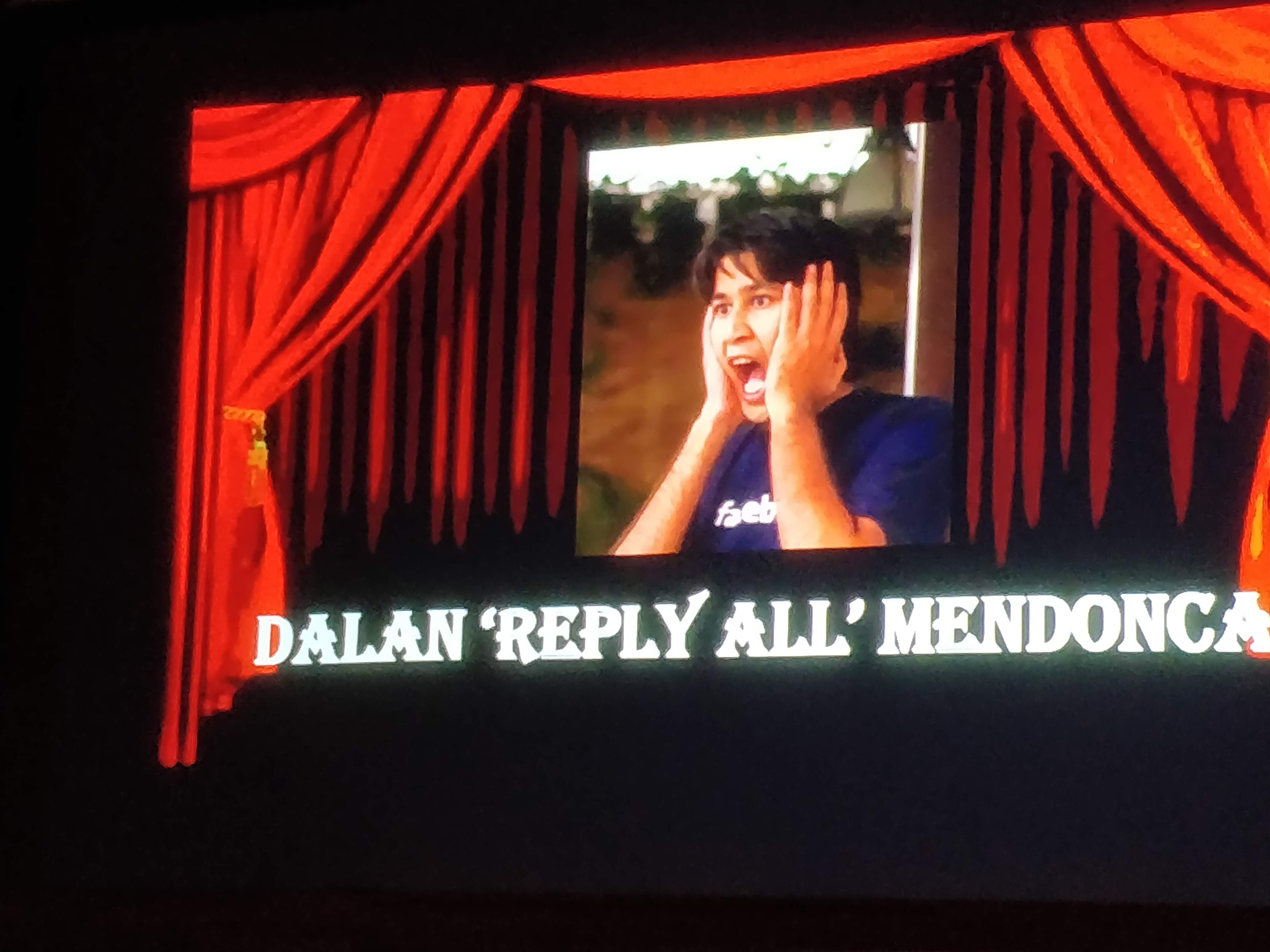 Placement season kicked off in earnest. We had overview session about how the process is going to work. I’ll give you a quick low down.
ISB has a department called CAS (Career Advancement Services) which is sort of our BD team. It manages the school’s relationship with companies and invites them to participate in the placement process
. As the placement sessions kicks off, students and recruiters get access to the college placement portal. Companies signup and post jobs. Student apply to these jobs as per the specified deadline usually with just their resume, some with an additional cover letter, presentation or solution to a problem posted by the company
. Those who clear this round (i.e. those who get an interview shortlist) are invited to interview with the company during placement week. Placement week is divided into Day 1, Day 2, .. with more elite companies in earlier days
. An additional constraint is that you can have max 6 shortlists for a given day. More details than necessary already shared.
Placement season kicked off in earnest. We had overview session about how the process is going to work. I’ll give you a quick low down.
ISB has a department called CAS (Career Advancement Services) which is sort of our BD team. It manages the school’s relationship with companies and invites them to participate in the placement process
. As the placement sessions kicks off, students and recruiters get access to the college placement portal. Companies signup and post jobs. Student apply to these jobs as per the specified deadline usually with just their resume, some with an additional cover letter, presentation or solution to a problem posted by the company
. Those who clear this round (i.e. those who get an interview shortlist) are invited to interview with the company during placement week. Placement week is divided into Day 1, Day 2, .. with more elite companies in earlier days
. An additional constraint is that you can have max 6 shortlists for a given day. More details than necessary already shared.
So, for a student, your personal funnel looks like: Apply with Resume (+ possible PPT) > Interview shortlist > (Possible) GD/Group round > Interview round (Usually 3-4) > Job offer > FAME AND FORTUNE AND SUCCESS It is considered a level-playing once you get the interview shortlist as interviewers/companies adjust for your past experience (or lack of it) when interviewing, so the biggest initial challenge for most students is to get shortlists from their desired companies. So the race to polish your resume to its hilt begin. To add to the mess, the ISB official resume format is dense like a log table with half inch margins and a size 11/12 font . Students end up packing this resume with information from edge to edge in the hope of not missing a single fact or anecdote that could land them their coveted jobs . For reference, my resume went from a cosy looking document with 550 words and ample whitespace to 806 words packed on a single page. To add to the fun, we had multiple sessions from different folks telling how to write the optimal resume . Which brings us to the dilemma of the century: RAC or STAR?
Students started sending in their resumes to alumni for reviews which started the barrage of feedback that is often conflicting feedback and many times hurtful (“Is this your first review?” an alumni will say before pointing out mistakes no one caught before). And slowly, super polished and prepared resumes started coming to life. As students got fatigued of polishing their resumes, interview prep began. As the term ended, most people formed their study groups for placements, huddling with people having similar career aspirations. As a sure sign of placements kicking off, companies started visiting campus for their pre-placement talks. As usual, the first company to visit was McKinsey. (Having attended career sessions to understand the consulting job, I had paid rapt attention to the details of a consultant’s job and concluded that it is not for me, so I promptly decided to give it a miss) . Samsung and Media.net followed soon after. Microsoft even conducted a PM workshop to familiarise students with the process of building products and providing an inside view of the job of a product manager . It was also a great chance to network with Microsoft employees (all of who also happened to be ISB alumni).
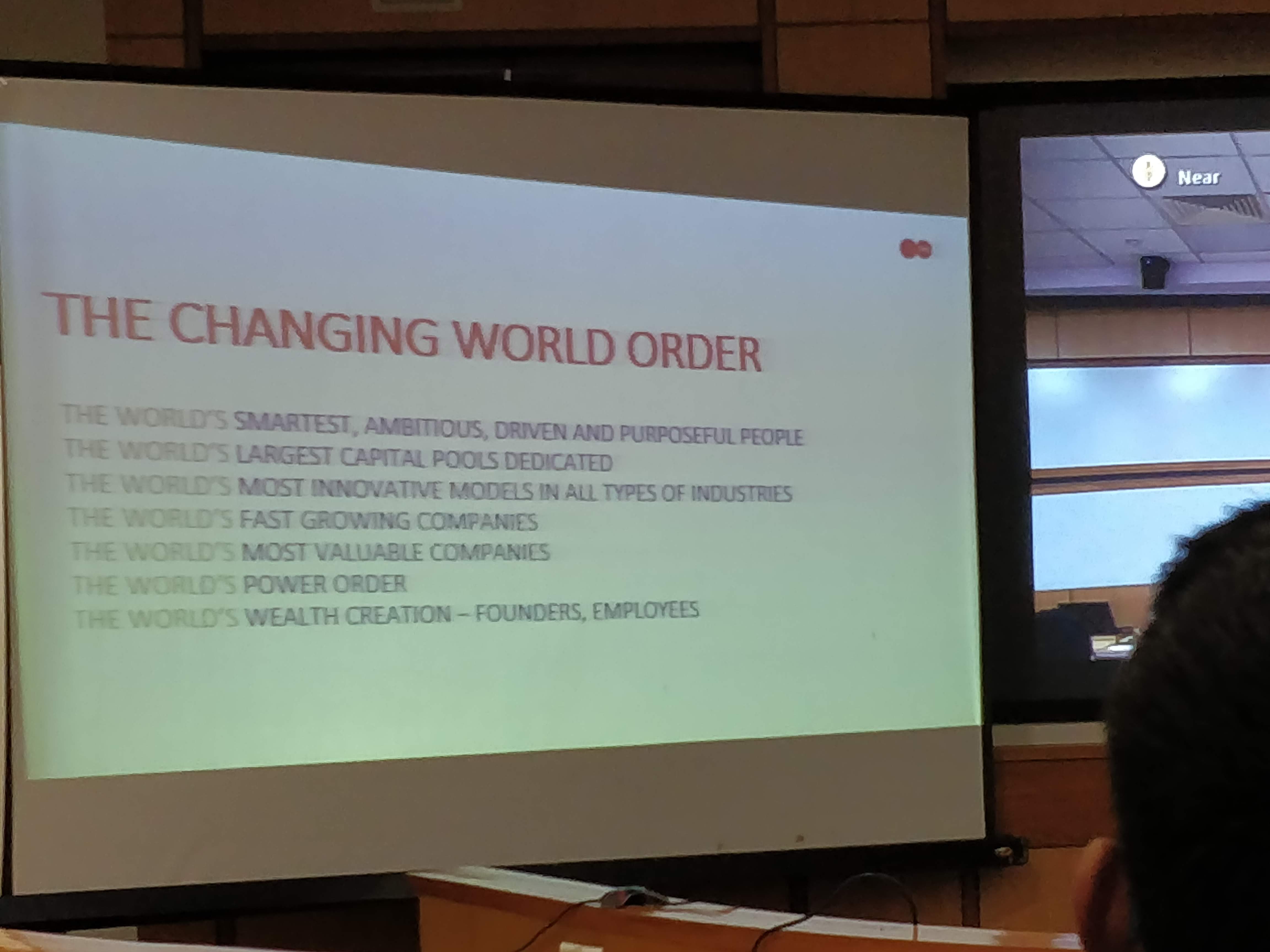 The Top 3 consulting companies run their process nearly a month ahead of all other firms with the shortlists coming the first. Though I hadn’t applied, as results started coming out, some were elated while many hearts were broken. Expected shortlists, shocks both positive and negative went around
. Shit had started getting real.
The Top 3 consulting companies run their process nearly a month ahead of all other firms with the shortlists coming the first. Though I hadn’t applied, as results started coming out, some were elated while many hearts were broken. Expected shortlists, shocks both positive and negative went around
. Shit had started getting real.
THIS.WAS.SPARTA. No one went home during the term break. Term 5: Armageddon Acads was the lowest priority activity this term. While earlier there was disengagement, this term there was active disinterest. The acdemic objective went maximise score most to minimize time . Students typically have to take 4 courses per term to get enough credits to graduate, this term most folks took 3 courses (the minimum you can take). I did the same . Additionally, all my courses were on the same day, so every alternate day and on weekends, I got the entire day to myself for complete uninterrupted placement prep.
Though I did have some very interesting courses. Term 5 had Marketing Research (MKTR), Marketing Services (MKSV) and Portfolio Management (PMTS). Marketing Research was one of the worst courses that I went through - an excessive analytical focus (this course was all about conjoint analysis), 8 AM classes, average professors and better things to than focus on studies meant I could barely involve myself with the subject and any involvement just felt horrible . The other two courses were amazing. Marketing Services was about designing service businesses but Professor Piyush Kumar took the course far beyond that . We not only learnt how to think about a business as a service system but also to develop a philosophy for our business that aligns it correctly with the market . The idea of designing a system that is a set of coherent choices instead of focusing on just the idea or the market was a good way to think about a business . Professor Piyush teaches the course in a very contrarian way with fun statements like “the customer is collateral damage” and “employees and customers are just constraints to profit” . The course embodied thinking about a business from a purely financial perspective, like a baniya would. Portfolio Management was introduction to the basics of modern portfolio theory along with some knowledge of how to think about and manage your own assets . It was course with a lots of practical take-aways. It was my first finance elective and I thoroughly enjoyed it, possibly because this course had a good mix of finance theory as well as human psychology.
PM Challenge One of the other reasons for participating in case competitions is the many companies use these as screening tools to find good candidates. Many companies offer direct entry to the interview round or a chance to interact with senior company leaders along with other prizes . So, case competitions become a route to sneaking past the competition when it comes to recruitment. One such competition I had in my sights was the Microsoft PM Challenge . Having worked as a start-up product manager and having decided to not pursue any other role, my goal out at ISB was to get into one of the big firms and work on consumer products with a large scale . So Microsoft and Amazon were the two companies I had in my sights. The PM Challenge offered a PPI which was a great way to increase my chances of getting selected . Having done a bunch of competitions with similar folks, I decided to rotate and teamed up Pooja Sinha, a former engineer from Microsoft. Our problem was to improve Sharepoint, Microsoft internal-wiki tool . I applied all my knowledge gleaned from working on SEO for Instamojo to create some fun new features. We also took ample help from alums to understand how to go about competition . We brainstormed, wrote, rewrote for 2 whole days before submitting our final entry. And soon the results were out and we had won! I was thrilled because I felt closer to getting into Microsoft.
Off with a bang: As a reality towards how good (or rather how bad you are at interviewing), the college arranges for two-three mock interviews with college alumni. One is just at the start of the prep season and the rest towards the very end . My first mock interview was scheduled with Sharad Agarwal, an experienced product manager at Flipkart. Given other work/commitments and how early in the prep process this was, I was hardly prepped for the interview . I was hoping to mostly wing it. I had been going through interviewing frameworks and had been discussing them with my group for the past week, so I felt I’d do ok . But I was not prepared for how badly I would screw up.
My interview was the last on his list and by the time my turn came, it was time for him to leave for his flight. So he gave me the option of interviewing over VC later or doing a walking interviewing . Not wanting to delay this, I decided to go for it right away. This means, me and Sharad are walking out of the library, across the college hallways and into the dining area with him bombarding me with questions and me trying to keep my sanity intact . Sharad was not one to let people off easy, the walking interview started with “I meet 20 new people every day, tell me something that will make me remember you” . This was followed by questions around my work-experience and then a design question. Having not being prepared for any behavioural questions, I was already flustered by the effort required to pull coherent answers out of my head . Despite having prepped a little bit, when I was handed the design question I jumped to the answer without clarifying any details about the problem. I made the most classic mistake . I realised this while I was giving the interview and wanted to end the interview right there. What’s the point of continuing when you’ve already made a bad impression, but I soldiered on anyway . At the end of the interview, I asked about whether such an interview performance would lead to a job offer, he stated the obvious when he said no. I was annoyed that I had screwed up in the dumbest way possible and fallen prey to my old habits . But at the back of my mind I was happy, badly screwing up this mock interview at the start of the prep season was the perfect way to light a fire and get me motivated to prep intensely in the coming days . Having gotten my resume reviewed and coming with PM experience, I knew that the only barrier to me getting good jobs would be interview performance.
Placement Prep 24x7
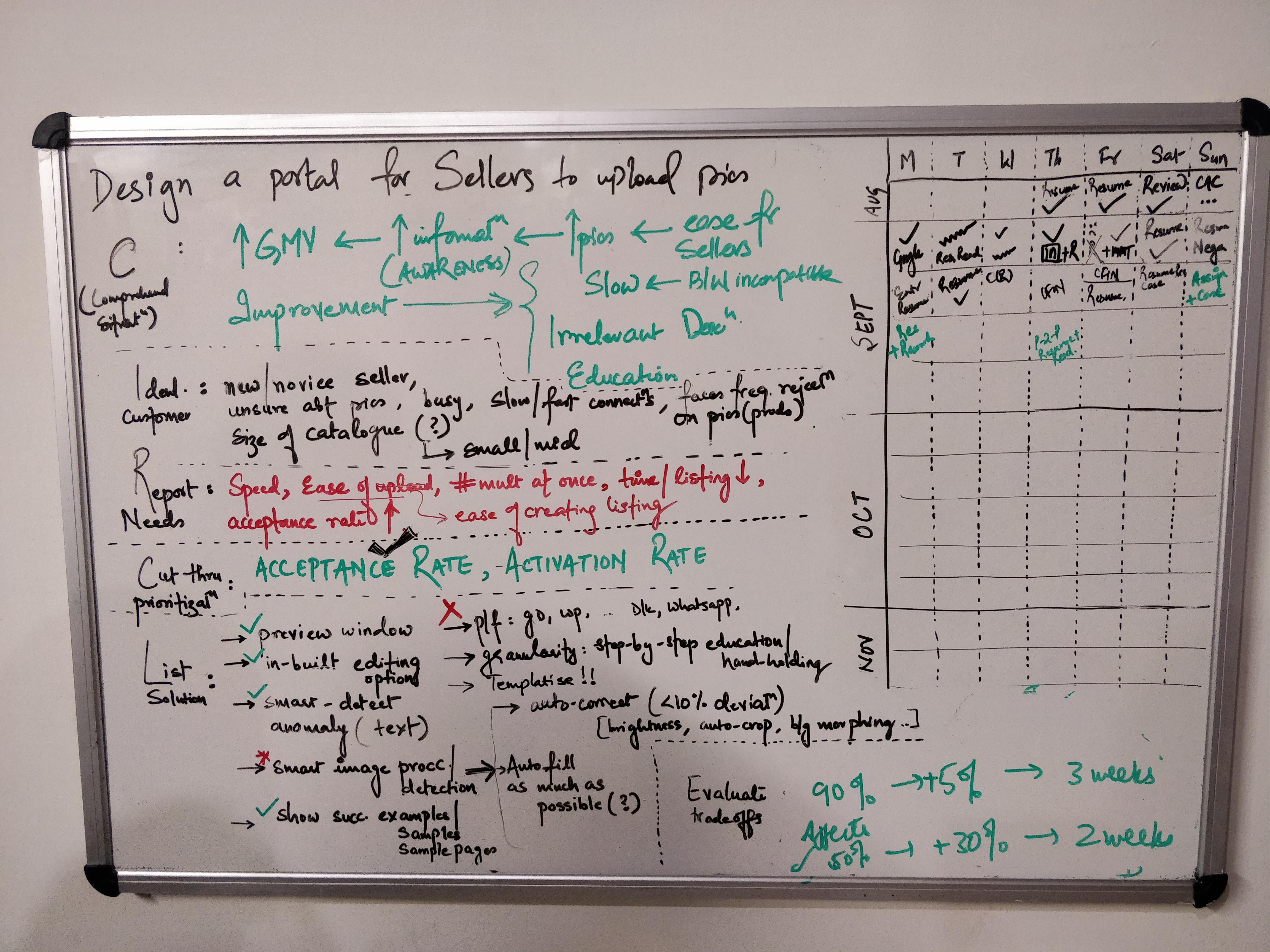 Placement season kicked off with people working with their study groups to discuss interview questions together. This was an entire group of 3-5 people discussing a question like “How would you launch a grocery delivery service for Flipkart”
. Here the entire group would slowly go through a known PM interview framework to familiarise themselves with the process of conversing in an interview
. Group solving involved a lot of brainstorming and multiple viewpoints, solving a single question took 1.5-2 hours.
Placement season kicked off with people working with their study groups to discuss interview questions together. This was an entire group of 3-5 people discussing a question like “How would you launch a grocery delivery service for Flipkart”
. Here the entire group would slowly go through a known PM interview framework to familiarise themselves with the process of conversing in an interview
. Group solving involved a lot of brainstorming and multiple viewpoints, solving a single question took 1.5-2 hours.
The first lesson learnt was to negate one’s natural instinct to provide an answer to a question as soon as it is asked. This is natural and normal habit that can wreak havoc in interviews . In normal life, the person in front of you is strapped for time and wants an answer as soon as possible. During interviews, the aim of the question is to understand the candidates thought process and clarity in thinking; the answer is many times immaterial . So instead of answering the question, you want to lay out the problem in front of the interviewer, tease out its various aspects, before moving towards your solution . All along making good conversation with your interviewer.
Once people were familiar with the flow of breaking down an interview question and had seen what kind of viewpoints they personally miss out on, the focus shifted to 1:1 mock interviews. 1:1 interviews were more time efficient (taking 20-45 minutes) and focused on only your answer. Later as people gained confidence, they did mock interviews with alumni . Alongside, people were devouring PM prep books, online videos on interviews and more to up their prep game. Interviewers also frequently have general discussions about the latest trends in tech, this meant everyone went scrambling to TechCrunch and other tech publications to understand what’s the latest in the industry . Along with my group, I think I averaged 1.5 interviews/day during prep season. It not just the interview that takes time, you also have to make notes about where you faltered and what you could’ve done better, followed by reflecting on how you can improve . So, an actual interview along with note-taking and mistake-finding is 2-3 hours long. The most common interview question for product managers is the design question “How will design an alarm clock for blind people” . Having practised the hell out of the design questions and experiencing fatigue and boredom with doing design questions all day long, we soon moved to other general questions like market-entry, strategy, technology stacks, etc . Interviewers can ask whatever they please and regardless of how much you prepare, one must be ready for thinking on the spot and still sounding composed, intelligent and eloquent! Nonetheless, I had tried my best to structure the interview process and practise the hell out of it . By the end of the prep season, I ended up with 14 question types with frameworks and typical responses for every question-type. This structure was not something that I was given but one that emerged from repeatedly interviewing with fellow students . This repository of knowledge itself was a great source of confidence.
D-day draws closer Companies had started posting jobs and deadlines had started flying past us. I was on the shortlists for Media.net and Matrix Partners (a venture capital firm) . After having spoken to a friend who worked in VC, I decided against pursuing it further and just winged my Matrix interviews.
Most things were getting into place when we got a little surprise. Flipkart (the biggest startup story out of India and one of the best companies to work for) was going to conduct a Day 0 process, a whole three weeks before placements. What is Day 0? As I mentioned earlier, all interviewing happens during placement week which consists of Day 1, 2, 3 etc. However, some companies conduct their process early, interviewing candidates before everyone else . Flipkart had just closed it submissions 2 days earlier and they were coming for interviews 2 days from now. I was amongst the people they had shortlisted . This was going to be my first real interview. Having screwed up multiple big company interviews before this, I was melting with nervousness. During the cab ride to the hotel that morning, despite being the most experienced candidate, I was the biggest nervous wreck . Flipkart was one of the companies I really wanted to work in. I was sweating profusely and nearly shaking, so much was at stake! Luckily, I was not amongst the first to be interviewed . Held up in the room full of candidates, as time passed by my nervousness mostly melted away with the ticking of the clock. Watching a few folks clear clear their first rounds gave me immense hope and calmed my nerves . My interview was scheduled for 12:30 but it only began at 3, after a really lovely lunch. My first two interviews happened pretty much on the trot followed by a 4 hour wait . Luckily, the recruiter had decided that people getting rejected would get the bad news right away so that they needn’t wait for long with false hopes of going ahead . Friends I knew who I expected would get the job offer, didn’t make it past the first round itself. The waiting room started to empty out. At 8:15 I went for my third interview and an hour later I had my final interview . All interviews had gone good, I had not screwed up anywhere and the conversations had been great; especially the last one with the Director of Product . There were five of us left in the room, nervously waiting for the final result. Not sure if we’d be in out or out. The recruiter appeared and started calling us out one by one . The first two people to get called out had come back with rejects, the third person to get called was me! My mind was going bonkers, was I also going to get rejected or would I be the one from whom the accepts list would start . I nearly went blank after the recruiter told me that I had made it. I just checked with him again that there would be no further rounds and let the happiness sink in . Me along two people from my very own study group had cracked the Flipkart PM job and we were all elated. The team took us out for a late dinner, belting some chicken, beers and VAT 69 along with some good conversations . This was surreal. It had happened so fast and here I was, exactly where I wanted to be, struggling to believe that I was really there. The joy actually actually took a couple of days to sink in . It was like someone told the clock that there are going to be no deadlines anymore. Purpose fulfilled. The other two were happy with their results and decided not to prep further . I still wanted to give Microsoft a fair shot. Getting the job offer from Flipkart really killed my motivation to prep, it took me a while to get back into prep mode.
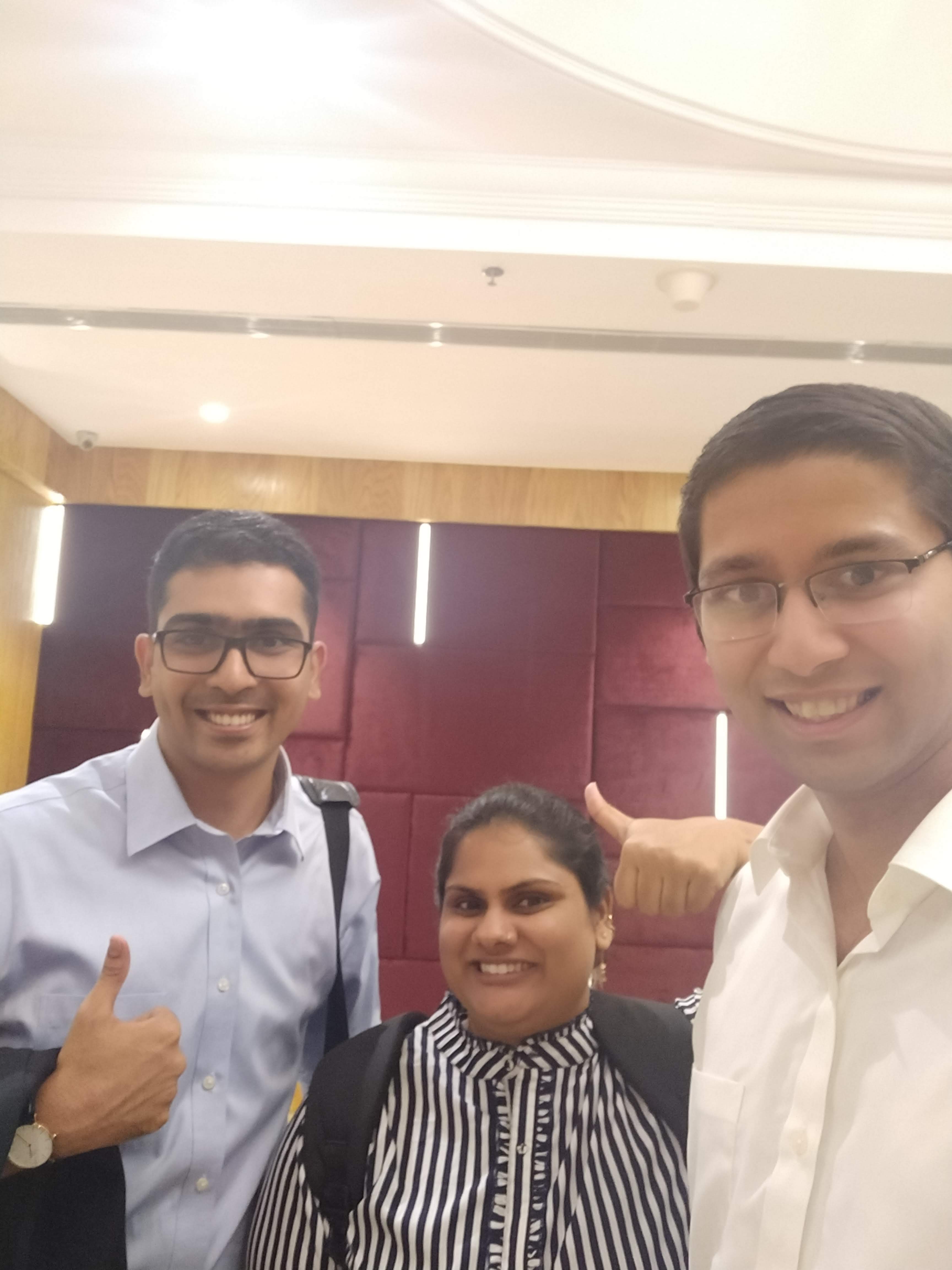 Two weeks went by slowly and D-day drew to a close. The whole Mohali campus flew to Hyderabad and checked into the Holiday Inn. It felt so good to partake in a hotel breakfast spread again
. Microsoft conducted a pre-process round before day 1 and I managed to clear that ok, despite being the slowest/last one to do so.
Two weeks went by slowly and D-day drew to a close. The whole Mohali campus flew to Hyderabad and checked into the Holiday Inn. It felt so good to partake in a hotel breakfast spread again
. Microsoft conducted a pre-process round before day 1 and I managed to clear that ok, despite being the slowest/last one to do so.
Having been through a whole interview process and having an offer in hand, I was much less nervous on Day 1. My Microsoft interview slot was scheduled at 8 AM but predictable delays meant that I went in at around 8:45. I had three interviews on the trot . My very first question was a standard technical one “How do you reverse a linked list?”. Having never coded professionally and having been a product manager since the past 3 years, this one caught me by complete surprise . I reached into the deep recesses of my memory, recalling information from 12th standard computer science classes to come up with an answer. After going through the problem and getting a hint from the interviewer, I gave what looked like a satisfactory result . The remaining questions were design problems and I was able to tackle them fairly well. I had my second interview was immediately after and unfortunately I got frightened because of the person interviewing me . My interviewer was the head of AI at Microsoft India, being aware of his made me fearful and put me on the backfoot. I also for some reasons assumed that this is a “leadership round” and that we would have general career discussions, no actual problem solving . So it took me while to figure out that he wanted me to solve a design question. Even then my performance was just ok, I struggled to switch modes and work my way towards a solution . Luckily, I did manage to get third round immediately after which again went splendidly well. Having finished all three of my interviews with Microsoft by around 10/1030 AM, I walked out of there with moderate confidence of landing the job . Moderate because the second round had not gone too well. Then I was off to check out my salary at Flipkart, I discovered that I was the only one they had offered a PM 2 role to . All other people selected were for PM 1. Lucky me. CAS sort of forced me to sit for Myntra despite me trying to convince them otherwise. My first Myntra interviewer was the person who had given me one of the worst interview experiences of my life a year earlier (this was before ISB) . Having met him again, I decided to stay calm and give it a clean shot again with no biases. The Myntra interviews were also very conversational with the team having former entrepreneurs working as PMs, something I’ve observed in many good teams . Here too I managed to get through all the rounds and given the nature of the interviews was expecting a positive result. I ended up getting my Microsoft result indirectly - A friend had overhead the Microsoft team talking about the selected candidates and my name was amongst them . I didn’t know whether to believe the rumour and start dancing already. By evening time, I received both the results. I had cleared both the companies . I was ecstatic to have cracked, though being tired I didn’t really show it. So, Microsoft it is!
 After this I went home and slept for 5-6 days straight. I had fallen a little sick and was exhausted along every dimension due to the placement process. It was a good rest.
Term 6: Where is my promised land?
85% of the batch got placed during the first week itself. A splendid result. Expectations in term 6 (now that most of us are placed): Oh I shall be free as a bird, mingle freely with my fellow mates, pursue my hobbies, travel, live my passions.
Reality: It’s fucking cold. I’m practically paralysed and all I do is dreaming of crawling out of bed. There are too many assignments and lectures to keep up with. Life is a chore.
After this I went home and slept for 5-6 days straight. I had fallen a little sick and was exhausted along every dimension due to the placement process. It was a good rest.
Term 6: Where is my promised land?
85% of the batch got placed during the first week itself. A splendid result. Expectations in term 6 (now that most of us are placed): Oh I shall be free as a bird, mingle freely with my fellow mates, pursue my hobbies, travel, live my passions.
Reality: It’s fucking cold. I’m practically paralysed and all I do is dreaming of crawling out of bed. There are too many assignments and lectures to keep up with. Life is a chore.
 On the acads front, this was one of my worst terms. To keep the load low in in future terms, I decided to take five courses this term (against the typical 4)
. Not a good idea. Seems like the college administration knows that students are just going to fart around after placements so they over-loaded students with assignments.
On the acads front, this was one of my worst terms. To keep the load low in in future terms, I decided to take five courses this term (against the typical 4)
. Not a good idea. Seems like the college administration knows that students are just going to fart around after placements so they over-loaded students with assignments.
My courses were Designing the Digital Value Chain (DDVC), Leveraging Social Media and Web 2.0 (LSAW), Asset Management (AMGT), Managing Complexity (MGCP) and Distribution Channels (DBCN). I sampled DDVC and felt it was a bad course from the first lecture itself. However, I woke up hungover for the 2nd round of elective bidding and couldn’t muster the willpower to log on and drop/swap the course . A terrible decision. LSAW was ok. I should have realised that ISB courses barely go into the depths of any subjects, so it best to focus on width and avoid courses you’re familiar with . LSAW and DDVC aimed to teach about ad-tech + social media landscape and emerging technologies respectively. As someone clued in heavily to the tech scene, they were completely redundant for me . Asset Management was tour of the Nobel Prize winning papers in finance, it really helped me get up to speed with a global understanding of markets and understanding the trend of indexing . We studied Warren Buffet and a few other successful investors and tried to understand if it was skill or luck that drove results. Distribution Channels was a nice window into what it takes to put products (Typically FMCG ones) on shelves for consumers to be able to purchase . We learnt an extensive framework to analyse the quality of a distribution channel. The course was taught by Professor Ahmed Timouni who is an extremely methodical and thorough educator, discussing the finest details of every case . Managing Complexity was taught by Ed Rogers, the Chief Knowledge Office of NASA. Though many people didn’t get this course I thoroughly enjoyed. It covered a vast array of ideas from game theory to making concept maps to understanding the rules of any system and trying to predict its behaviour . We discussed how the rules of a game/system if poorly setup can inevitably lead to disaster regardless of how smart the people involved are. As a fan of all knowledge about human systems, this course was an absolute thrill.
But things actually changed. No one gave a flying fuck about acads, even the usual suspects were chilling now that the incentives were gone. A lot more people went to the gym and plated TT and other good stuff . Lucky students who took easier/fewer courses also watched movies and TV shows. This was not a pleasure bestowed on me. 3 out of my 5 courses had an assignment submission for every class, that’s pretty much all I did during this entire term.
But I did manage to do a few fun things.
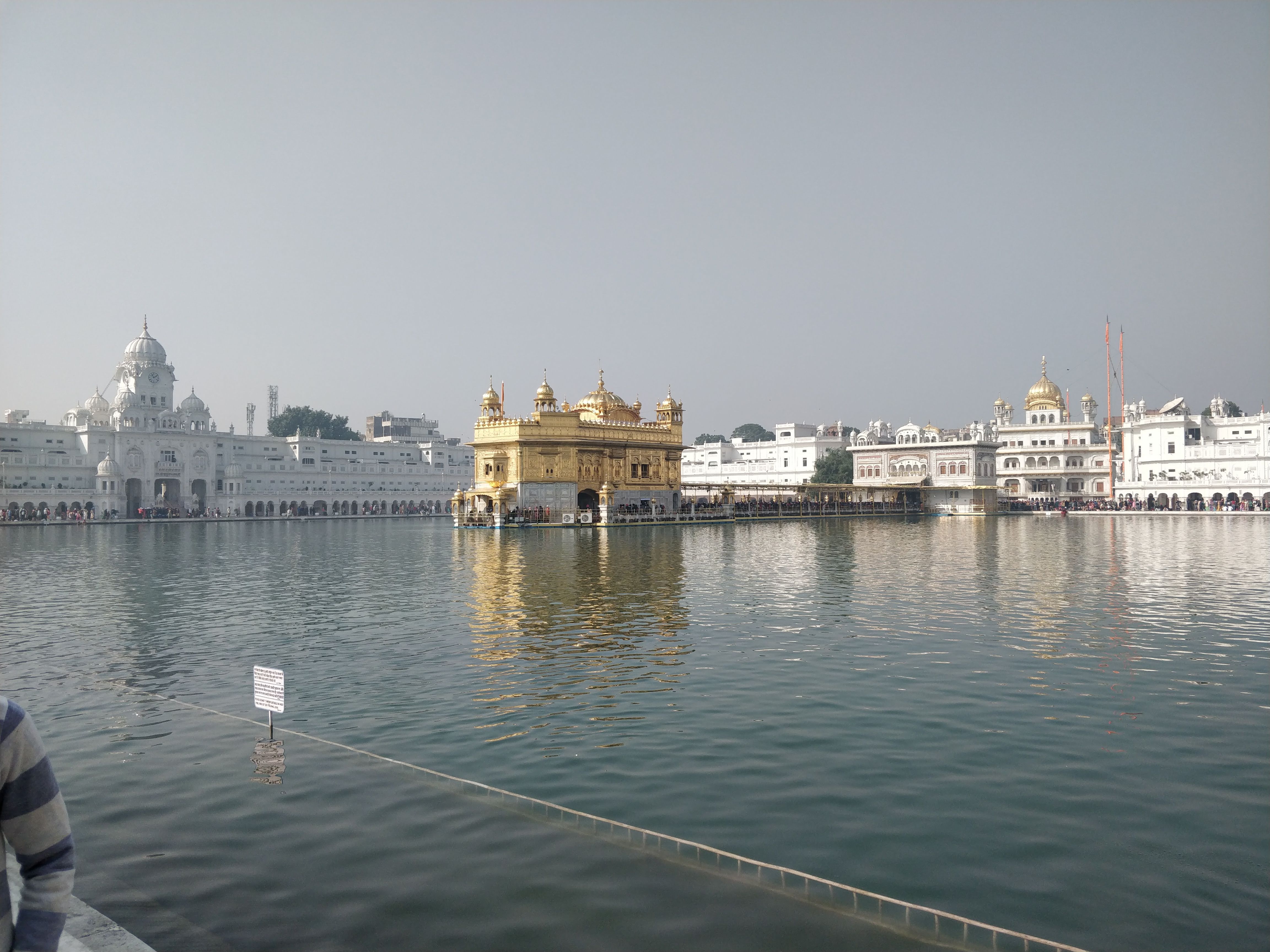
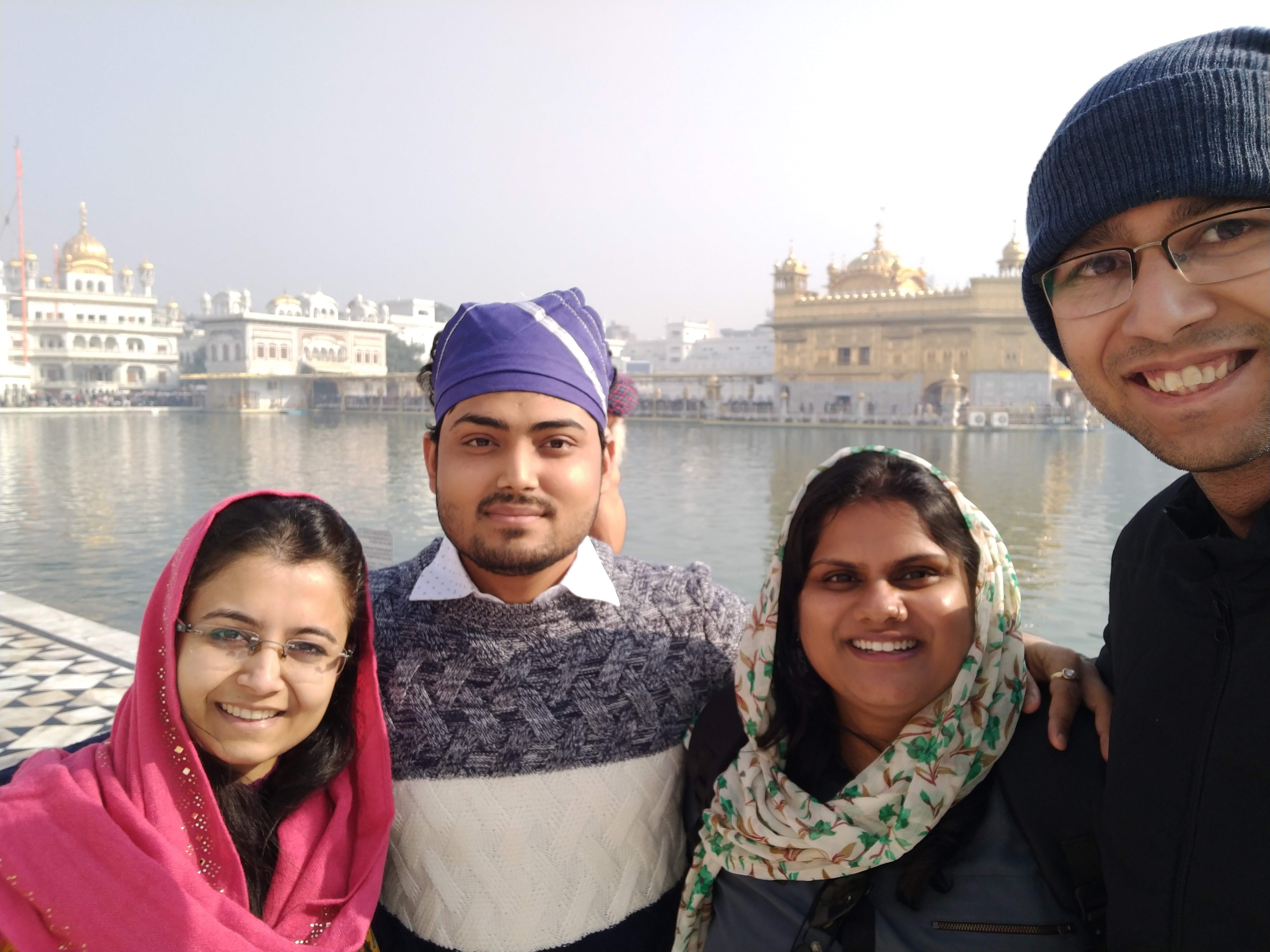
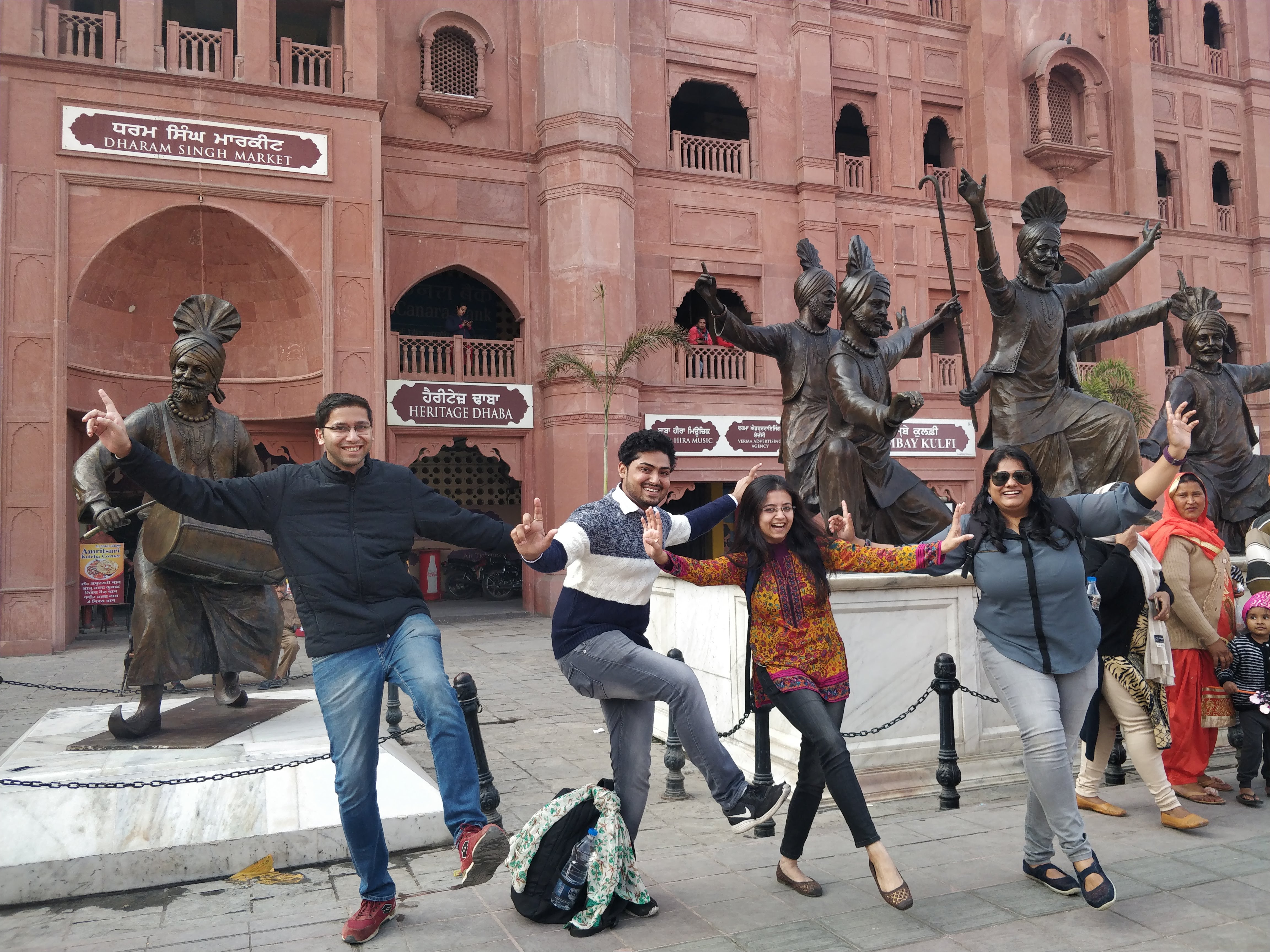 After years of thinking about it, I managed a trip to Amritsar and visited the Golden Temple. The food in Amritsar is amazing, everyone should go to Kesar Da Dhaba and belt the amazing food and sweets there
. The paranthas in Amritsar are so full and rich with butter, all other paranthas seem fake.
After years of thinking about it, I managed a trip to Amritsar and visited the Golden Temple. The food in Amritsar is amazing, everyone should go to Kesar Da Dhaba and belt the amazing food and sweets there
. The paranthas in Amritsar are so full and rich with butter, all other paranthas seem fake.
I travelled to Hyderabad for the national finals of the Microsoft PM Challenge. We were competing against all the elite B-schools in the country (IIM A/B/C, XLRI, ISB) . After a fun networking dinner, a slew of presentations, we discovered that … we had won again! Unbelievable but true :D
I was happy that I got to visit the Microsoft India campus, which turned out to HUGE. It is right next to ISB Hyderabad and shares a wall with it! A fun highlight was a visit to Microsoft Garage, a makerspace for employees with 3D printers, soldering irons, circuit printers, VR/AR headsets, etc. where employee can work on side-projects . It seemed really cool.
I scrambled across the country to attend two friends wedding back to back. My journey to Hyderabad involved me missing flight for the first(?) time in my life, for no fault of my own . My Air India flight from Chandigarh to Delhi was delayed and to my dismay, I realised my connecting flight was in another terminal which is Delhi means I had to travel 10 kilometres away :X.
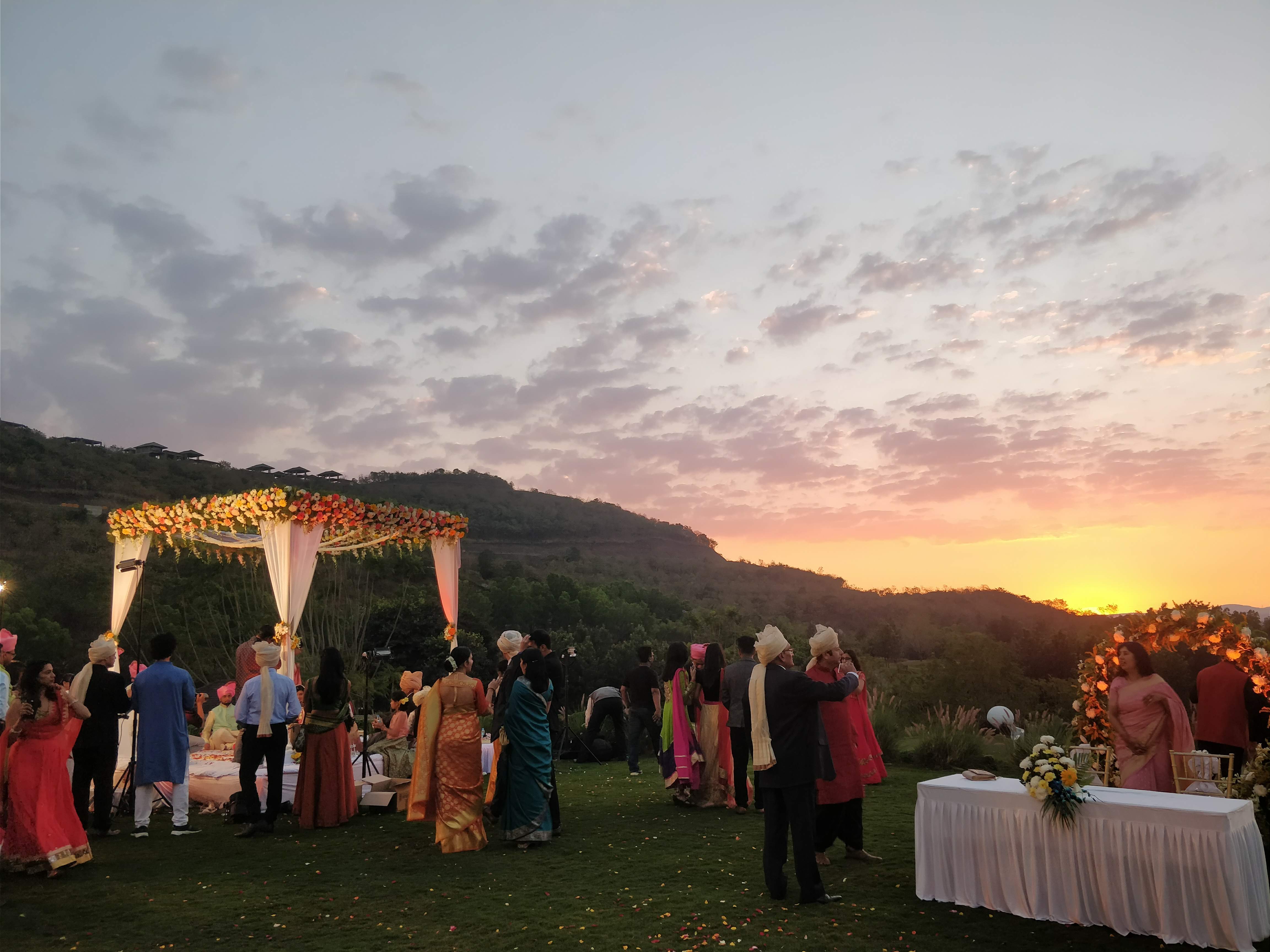 But the weddings were great and it was good to meet friends after a long time. Though very sober conversations happened.
There was a campus bonfire which broke the tradition of people just idling away in their rooms.
This term was the least I prepared for any exams ever. I hope the cold warms up soon.
But the weddings were great and it was good to meet friends after a long time. Though very sober conversations happened.
There was a campus bonfire which broke the tradition of people just idling away in their rooms.
This term was the least I prepared for any exams ever. I hope the cold warms up soon.


